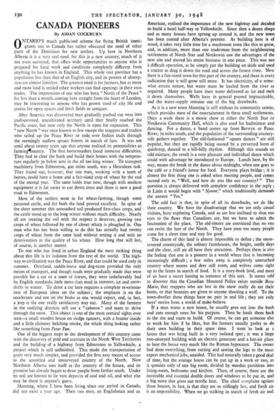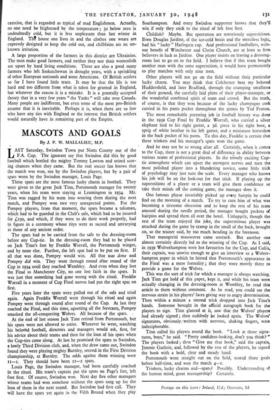CANADA PIONEERS
By AIDAN COCKBURN ONTARIO'S much publicised scheme for flying British immi- grants out to Canada has rather obscured the need of other parts of the Dominion for new settlers. Up here in Northern Alberta it is a very real need, for this is a new country, much of it not even surveyed, that offers wide opportunities to anyone who is prepared for hard work and conditions completely different from anything he has known in England. This whole vast province has a population less than that of an English city, and its powers of absorp- tion are almost limitless. The greatest need is for farmers, but as more and more land is settled other workers can find openings in their own trades. The impressions of one who has been " North of the Peace " for less than a month, coming here straight from the heart of London, may be interesting to anyone who has grown tired of city life and yearns for open spaces and fresh fields to conquer.
After America was discovered men gradually pushed out west into undiscovered, uncultivated territory until they finally reached the Pacific coast, but now only the North is open for expansion. This " new North "was once known to few except the trappers and traders who sailed up the Peace River or rock over Indian trails through the seemingly endless spruce forests in search of furs. It was not until about twenty years ago that anyone realised its potentialities as farininetountry. The first homesteaders faced immense difficulties. They had to clear the bush and build their homes with the tempera- ture regularly 3o below zero in the all too long winter. To transport machinery from Edmonton, 400 miles south, was a Herculean task. They found out, however, that one man, working with a team of horses, could have a home and a fair-sized crop of wheat by the end of the second year. The same holds true now, though with modern equipment it is far easier to cut down trees and there is now a good road to Edmonton.
Most of the settlers went in for wheat-farming, though some pastured cattle, and for both the land proved excellent. In spite of the short summer this untouched soil produced first-class crops, and the cattle stood up to the long winter without much difficulty. Nearly all are treating the soil with the respect it deserves, growing two crops of wheat followed by one of clover which is ploughed in. One man who has not been willing to do this has actually had twenty crops of wheat from the same land without resting it and with no deterioration in the quality of his wheat. How long that will last, of course, is another matter.
To one who has lived in urban England the most striking thing about this life is its isolation from the rest of the world. The high- way to civilisation was the Peace River, and that could be used only in summer. Overland, saddle-horse and dog-team provided the only means of transport, and though roads were gradually made that were possible for a car or a team of horses, they were unbelievably bad by English standards, little more than mud in summer, ice and snow- drifts in winter. To drive a car here requires a complete re-orienta- tion of European ideas on the subject ; the emphasis is on the accelerator and not on the brake as one would expect, and, in fact, a jeep is the one really satisfactory way out. Many of the farmers in the outlying districts still use a "caboose" and team to drive through the snow. This object is one of the most comical sights ever seen—a small wooden house on sledge rpnners, with a brazier inside and a little chimney belching smoke, the whole thing looking rather like something from Peter Pan.
One of the biggest steps to the development of this country came with the discovery of gold and uranium in the North West Territories and the building of a highway from Edmonton to Yellowknife, a project which is still unfinished. This made the transportation of grain very much simpler, and provided the first easy means of access to the unsettled and unsurveyed country of the North. Now Northern Alberta sees itself as the country of the future, and its promise has already begun to draw people from farther south. Under its soil are known to lie vast deposits of coal and oil, and what else may be there is anyone's guess.
Manning, where I have been living since our arrival in Canada, did not exist a year ago. Then two men, an Englishman and an
American, realised the importance of the new highway and decided to build a hotel half-way to Yellowknife. Since then a dozen shops and as many houses have sprung up around it, and the new town has been named after Alberta's premier. As building here is of wood, it takes very little time for a mushroom town like this to grow, and, in addition, more than one tradesman from the neighbouring settlements of North Star and Notikewin saw the advantages of the new site and moved his entire business in one piece. This was not a difficult operation, as he simply put the building on skids and used a tractor to drag it down the road and across the frozen river. Now there is a fair-sized town for this part of the country, and there is every indication that it will grow still more. It has electricity, of a some- what erratic nature, but water must be hauled from the river as required. Many people have their water delivered as ice and melt it down themselves. Wells have in general proved impracticable, and the water-supply remains one of the big drawbacks.
As it is a new town Manning is still without its community centre, which provides most of the entertairunent in these small settlements. Once a week there is a movie show at either the North Star or Notikewin Community Hall, which is also used for badminton and dancing. For a dance, a band comes up from Berwyn or Peace River, 70 miles south, and the population of the surrounding country- side gathers together. The old-fashioned " square dances " are still popular, but they are rapidly being ousted by a perverted form of quickstep, danced to a hill-billy rhythm. Although this sounds an odd mixture, the result is a very pleasant and individual dance which could with advantage be introduced to Europe. Lunch here, by the way, means the break in the dance about midnight, when one goes to the café or a friend's house for food. Everyone plays bridge ; it is almost the first thing one is asked when meeting people, and comes second only to, " Well, and how do you like our country? " This queStion is always delivered with .complete confidence in the reply ; in Latin it would begin with Monne," which traditionally demands the answer " Yes."
The odd fact is that, in spite of all its drawbacks, we do like their country. We have the disadvantage that we are only casual visitors, busy exploring Canada, and so are less inclined to shut our eyes to the flaws than Canadians are, but we have to admit the fascination of the place. The old-timers are convinced that no one can resist the lure of the North. They have seen too many people come for a short time and stay for good.
The charm of this land is almost impossible to define ; the snow- covered countryside, the solitary farmhouses, the bright, sunlit days and the clear, still air all have their attraction. Perhaps there is also the feeling that one is a pioneer in a world where that is becoming increasingly difficult ; a few miles away is completely untouched country where moose and deer still roam, and wolves come right up to the farms in search of food. .It is a story-boOk land, and most of us have a secret leaning to romance of this sort. It seems odd to discover that the Canadian Mounted Police exists outside Rose Marie, that trappers who are lost in the snow really do eat their boots, or that bounties are given to anyone shooting a wolf. To the town-dweller these things have no part in real life ; they are only boys' stories from a world of make-believe.
If a man wants a new house, he usually goes out into the bush and cuts enough trees for his purpose. Then he hauls them back to the site and starts to build. Of course, he can get someone else to work for him if he likes, but the farmers usually prefer to do their own building in their spare time. I went 'to look at a house that was being built in a very isolated spot ; it was a large two-storeyed building with an electric generator and a hot-air plant to heat the house very much like the Roman hypocaust. The owner had done everything, from cutting and sawing the logs to the most expert mechanical jobs, unaided. This had naturally taken a good deal of time, but the average house can be put up in a week or two, as it consists only of one big room, divided by wooden partitions into living-room, bedrooms and kitchen. Then, of course, there are the inevitable and essential double doors and windows to be put in, and a big stove that gives out terrific heat. The chief complaint against these houses, in fact, is that they are so stiflingly hot, and fresh air is an impossibility. When we go walking in search of fresh air and
exercise, that is regarded as typical of mad Foglishmen. Actually, no one need be frightened by the temperature ; 3o below zero is undoubtedly cold, but it is less unpleasant than last winter in England. Tht house one lives in and the clothes one wears are expressly designed to keep the cold out, and chilblains are an un- known irritation.
A large proportion of the farmers in this district are Ukrainian. The men make good farmers, and neither they nor their womenfolk are upset by hard living conditions. There are also a good many farmers who left Saskatchewan in drought years, with a sprinkling of other European nationals and some Americans. Of British settlers so far I have found little trace. It may be that the life is too hard and too different from what is taken for granted in England, but whatever the reason it is a mistake. It is a generally accepted theory that in a very few years " the Yanks " will take over Canada. Many people are indifferent, but even some of the most pro-British assume that it is inevitable. Perhaps it is, when there are so few who have any ties with England or the interest that British settlers would naturally have in remaining part of the Empire.



































 Previous page
Previous page